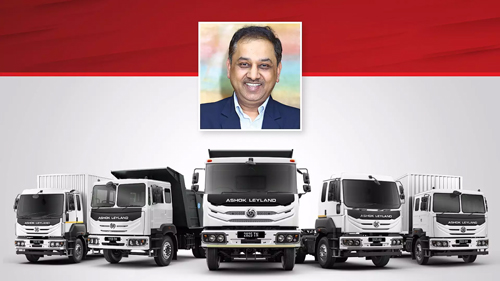
Shenu Agarwal, Managing Director and Chief Executive Officer of Ashok Leyland, believes that the plant capacity built so far for trucks and buses may have to be “built in a different way henceforth”.
From his point of view, it will now happen largely in new technology areas. “The commercial vehicle industry may have built capacity for 10 years. Will it go to that level in 10 years?” he wondered. The evolving scene, therefore, required a relook at the way capacity was being built by companies.
Agarwal took charge last December and, over the next couple of months, unveiled the country’s first hydrogen internal combustion engine (H2-ICE)-powered heavy duty truck. A collaborative initiative between Reliance Industries and Leyland, it was flagged off by Prime Minister, Narendra Modi, at the India Energy Week in Bengaluru.
The H2-ICE 19-35 tonne truck’s overall architecture, which is similar to that of a conventional diesel-based combustion engine, helps in quicker migration to cleaner energy sources at relatively low costs. Leyland had earlier showcased its futuristic vehicle range, powered by electric and hydrogen options, at Auto Expo 2023 in Delhi.
In January this year, Adani Enterprises inked a deal with the company and Ballard Power to launch a pilot project for development of a hydrogen fuel cell electric truck (FCET). This was intended for mining logistics and transportation — a first in Asia. It is scheduled to be launched in India this year.
Agarwal is convinced that the commercial vehicle industry has accepted that change is inevitable. “An LNG or hydrogen truck are completely different animals and everything needs to be done from scratch which, in turn, needs huge investments. This realisation has now come,” he said.
From Leyland’s viewpoint, this change had given it a chance to create a different position. Agarwal said it was the responsibility of industry to facilitate and invest in this change “It is very important not just for the betterment of the industry but of the whole nation. Issues like carbon neutrality have to be handled and are the focus areas for us now,” he added.
This needs to be in sync with its global aspirations and Leyland will look at “some India-like markets where our products and technology give us elbowroom”. The company is focusing on SAARC, Africa, Gulf Cooperation Council and Latin America.
According to Agarwal, its strong distribution network and product acceptance would help Leyland get significant market share in these countries. Going forward, the focus is on developing a product range that can cater to Europe, the U.S. and the like. “I think it is a journey and we are very enthused about the results we are getting,” he said.
On the electric vehicle transition, he felt this would take a while. “We are very focused on the right investment in this space and want to lead the change not just in terms of technology. We are also looking at a lot of other areas where we can partner or at least participate,” elaborated Agarwal.
The Leyland MD was also upbeat about preowned vehicles and said technology would impact the business. “The idea of getting into the preowned vehicle space is to help hold the value for millions of vehicles plying now at a reasonable level,” he said.
As he explained, there was massive disruption now underway with hydrogen and EVs which only meant that “there is no way you can just be an original equipment manufacturer”. Likewise, the Switch electric buses are not being sold but operated by Leyland which also has its own drivers. “We give them on lease to state governments and get paid per km,” he said.
Leyland recently rolled out its preowned commercial vehicle business and has teamed up with Mahindra First Choice Wheels. The `phygital’ platform will help in proper disposal and purchase of old commercial vehicles. In the process, it will help the company access a slew of fleet and single-truck owners across India.
Courtesy: Mobility Outlook
|
